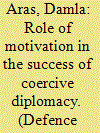| Srl | Item |
| 1 |
ID:
089562


|
|
|
|
|
| Publication |
2009.
|
| Summary/Abstract |
Understanding the nature of state motivation in sponsoring non-state armed groups is of great significance to the countries countering these sponsor-states. An analytical understanding of this phenomenon entails comprehending its characteristics which is translated as its strength. Such an understanding is crucial because several coercing countries have failed to persuade their opponents, due to their strength of motivation, to comply with their demands despite their military superiority. Given the increasing number of states using coercive strategies, developing realistic and effective strategies by understanding the opponent's motivation becomes all the more important. Despite its importance, although there are studies examining the underpinnings of the motivations of non-state armed groups, only a few studies analyse the polymorphous character of the sponsor-state's motivations, let alone its impact on the outcome of the coercing state's strategies.1
|
|
|
|
|
|
|
|
|
|
|
|
|
|
|
|
| 2 |
ID:
089564


|
|
|
|
|
| Publication |
2009.
|
| Summary/Abstract |
Understanding the nature of state motivation in sponsoring non-state armed groups is of great significance to the countries countering these sponsor-states. An analytical understanding of this phenomenon entails comprehending its characteristics which is translated as its strength. Such an understanding is crucial because several coercing countries have failed to persuade their opponents, due to their strength of motivation, to comply with their demands despite their military superiority. Given the increasing number of states using coercive strategies, developing realistic and effective strategies by understanding the opponent's motivation becomes all the more important. Despite its importance, although there are studies examining the underpinnings of the motivations of non-state armed groups, only a few studies analyse the polymorphous character of the sponsor-state's motivations, let alone its impact on the outcome of the coercing state's strategies.1
|
|
|
|
|
|
|
|
|
|
|
|
|
|
|
|
| 3 |
ID:
106795


|
|
|
|
|
| Publication |
2011.
|
| Summary/Abstract |
Several countries have used coercive diplomacy to dissuade sponsor-states from supporting non-state armed groups. This study argues that when a sponsor-state and a non-state armed group's common identity creates common aspirations and motives, coercive diplomacy towards the sponsor-state is unlikely to succeed in the long-term. To assess its efficacy, this research examines Turkey's strategy towards Syria in 1998 and in northern Iraq from 2007 onwards. Under the abovementioned conditions, it concludes that there has been no conclusive evidence for Turkey's assumption that its approach would succeed; therefore, it should utilise alternative strategies to coercive diplomacy.
|
|
|
|
|
|
|
|
|
|
|
|
|
|
|
|